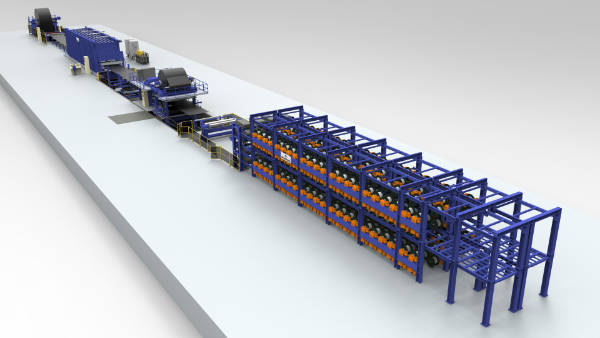Defying the trend: No sign of slowdown for Fenner Dunlop
Article published by Australian Mining
The mining industry’s increasing demand for efficient conveyor belt solutions has driven conveyor belt manufacturer, Fenner Dunlop, to expand its Western Australia manufacturing facility to keep up.
While many Australian manufacturers have seen a slowdown in business as a result of the COVID-19 pandemic, conveyor company Fenner Dunlop is defying this trend by investing in more production capacity.
After investing $70 million to build its steel cord plant at Kwinana in Western Australia in 2009, Fenner Dunlop spent another $20 million in 2013 to double the plant’s production capacity by installing a second press line.
In July this year, the company announced a decision to invest a further $23.5 million to commission a third press line for the plant, boosting its capacity by another 50 per cent.
Fenner Dunlop chief operating officer Steve Abbott believes the company’s consistent growth has been in line with its mining clients’ objectives of higher production efficiencies and “near-field” mine development.
“Over the past years, demand for conveyors has followed the general trends in mining, which is a demand for increased productivity, production volumes and speed. To keep pace with the requirements of our mining clients, we have had to invest in manufacturing stronger and wider belts,” he tells Australian Mining.
“Our plan has always been to make incremental investments when the existing capacity becomes constrained, going from one to two to three press lines at Kwinana. We will eventually fill that capacity and look for further incremental investments once another constraint emerges. Last year we invested in a new idler plant in Brisbane which is approaching a capacity constraint. By the end of the year we will open a new state-of-the art pulley manufacturing facility, also in Brisbane.”
The Kwinana plant is Fenner Dunlop’s 15th global conveyor belt manufacturing facility and its fourth steel cord plant. The facility currently houses two of the world’s largest steel cord press lines, measuring 18.5 metre in length and having the capability to produce steel cord and rubber ply belts up to 3200 millimetres wide and up to 50 millimetres thick.
Kwinana’s third press line, which is expected to become operational by January 2022, will increase the plant’s belt making capacity by 50% per year.
For the third press line, Fenner Dunlop has again partnered with German company Siempelkamp to develop a 18.5-metre long multi-piston press line, offering enhanced features to produce ply belts more efficiently, Abbott says.
“The technology that we use at Kwinana is the best in class. Being German-manufactured, the press line is designed to last many decades. One of the key features that helps increase the plant’s efficiency is that the press line can be set up for the next job even as the current order is being processed, which offers significant time and cost-savings,” Abbott says,
While many companies are moving their manufacturing operations offshore, Abbott says Fenner Dunlop is proud to be manufacturing close to its key mining clients in Western Australia, while still maintaining its globally competitive prices.
“One of the main reasons why we are keeping our cost competitiveness is our focus on efficiency and making investments in the plant. We are an extremely efficient producer,” he says.
“The size and quality of the equipment, the commitment of the team to make sure we are efficient with raw material sourcing and that there’s no waste, these are things that we have really been focused on over the past years and that’s put us in a price-competitive position.”
Another factor behind Fenner Dunlop’s success, according to Abbott, has been focusing on providing complete conveyor system solutions, rather than only focussing on conveyor belts.
“In 2012 we developed the business model of engineering conveyor solutions. Our focus has been on being the best in class in providing solutions to customers in total conveyor systems. We’ve been consistent in this focus and have developed a great team with a shared ambition to succeed,” Abbott says.
“It’s been an eight-year journey, but I think now we are seeing the benefit, where increased demand from our customers has prompted us to invest in more capacity and more in our people.
“We’ve recently extended contracts with come of our largest customers and in their assessments, we’ve ranked first in factors such as product quality, security of supply, technical support, continuous improvement and innovation and lead time. It is our focus on these factors that has placed us at that number one spot with our customers.”
In 2018, Fenner Dunlop was acquired by the multinational tyre manufacturer, Michelin. Abbott says the acquisition has not changed the way the business is operated internally, but it has assisted with transfer of technical knowhow from Michelin.
“Both Fenner Dunlop and Michelin have an ambitious goal to improve in the re-use and recycling of used conveyor belts and tires. It’s a big challenge, not just for us, but for the industry as a whole,” he says.
“But we are taking a long-term approach to make sure that we put our business in a position that we can meet our customers’ requirements, while also meeting our environmental goals.”
Having spent heavily on technology improvements and research and development over the years, Abbott hints that Fenner Dunlop is also at the cusp of introducing new technology for conveyor system performance monitoring.
“Over the past 12 months, we’ve been investing heavily on technology that will give us gather better information to monitor the performance of conveyor systems in general. We hope to be able to announce big news in the fourth quarter of this year, which will be a game-changer for the industry.”
Watch this space for more.
